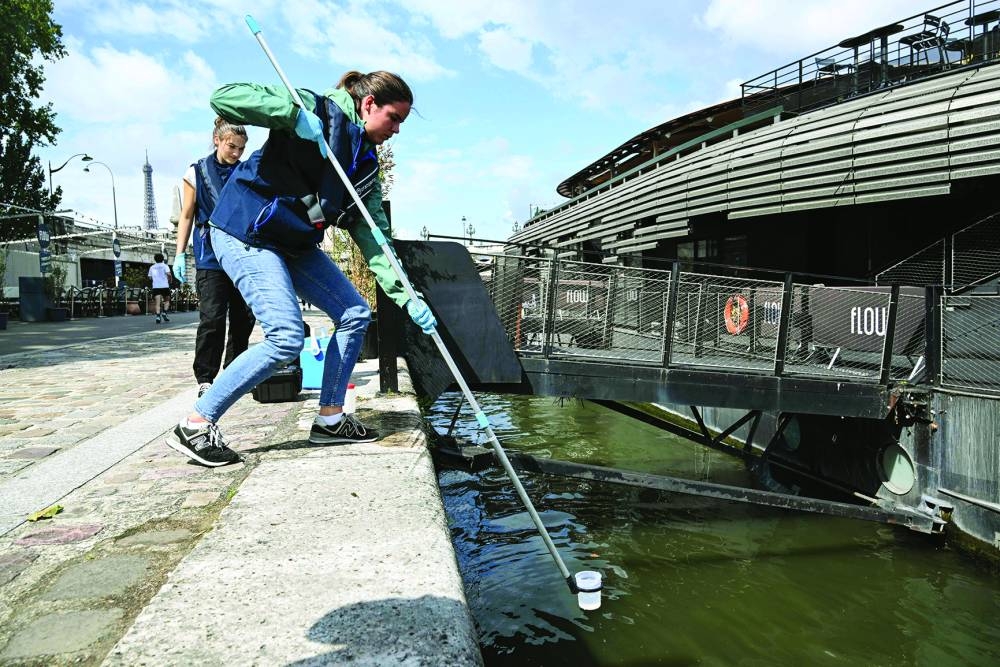Participants of this weekend’s Open Water Swimming World Cup were barred from a morning training session in Paris’ river Seine on Friday as heavy rainfall caused water quality to dip below health standards, while a women’s event was postponed.
Organisers said the women’s 10 kilometre race originally planned for today - a qualifying event for marathon swimming at the Paris 2024 Olympics - had been postponed to August 6.
International federation World Aquatics did not immediately respond to a request for comment about further backup plans for the races if the Seine’s water quality does not improve this weekend.
“If the results are bad again ... obviously, to ensure the swimmers’ safety, we’ll have to continue with the same restrictions,” said engineer Aurelie Lemaire, as she was taking samples from the Seine.
Last year’s open-water swim competitions took place at the French capital’s Parc de la Villette in northern Paris.
The city has been working on clean-up efforts to make the Seine swimmable again, as it was during the 1900 Paris Olympics more than a century ago.
But heavy rain causes the Parisian sewage system to overflow and be discharged into the river, polluting it with fecal bacteria E.coli and Enterococcus.
As a result, bathing in the Seine has been banned since 1923, with promises to restore water quality going back to 1990, when Paris mayor Jacques Chirac - later French president - vowed to make the Seine swimmable again.
“(Water) quality varies greatly depending on the weather,” said engineer Maelys Hemon.
Construction on an €80bn euro ($88bn) underground overflow basin designed to prevent such contamination is expected to be completed before summer 2024.
Cancelling the Seine swimming events would be bad optics for Paris ahead of the Olympics - this year’s first three qualifying races were swum in idyllic locales including the Red Sea’s Soma Bay in Egypt and Sardinia’s Golfo Arancini in Italy.
Meanwhile, tourists wondered whether cleaning up the Seine would be possible at all.
“We were wondering when we came and we did take a cruise on the Seine, how they could possible get the water clean enough and safe enough for swimmers in a short period of time also with all the visitors still coming,” said US tourist Lisa Larson.
“It’s a worthwhile undertaking but I don’t know if financially and technologically that could be done,” said tourist Glen Kundert.
Alberta government withdraws support of 2030 Commonwealth Games bid
The province of Alberta withdrew its support for a possible bid to host the 2030 Commonwealth Games on Friday, ending the chance of bringing the multi-sport event back to Canada.
Minister of Tourism and Sport Joseph Schow said in a statement that hosting the Games, which typically attract more than 4,000 athletes from the 54 nations of the Commonwealth, was not in line with the interests of Alberta taxpayers. Schow said that according to current bid estimates hosting the event “could result in a cost of up to CAN$2.68bn (US$2.01bn).
“The corporate sponsorship model and limited broadcast revenues for the Commonwealth Games would have put 93 percent of those costs and risks on taxpayers,” he added.
“We committed to remain transparent with Albertans about the costs of hosting international sporting events and clearly demonstrating a return on our investment for the people and communities in Alberta,” Schow said.
“That is why we have made the decision not to continue pursuing the bid for the 2030 Commonwealth Games.”
The move comes weeks after the Australian state of Victoria pulled out of hosting the 2026 Commonwealth Games because of escalating costs, leaving organizers “hugely disappointed.”
Victoria state premier Daniel Andrews said the initial estimate of Aus$2bn (US$1.36bn) needed to hold the Games would more likely be closer to Aus$7bn.
Commonwealth Sport Canada, the body responsible for organizing Canadian teams participating in the Commonwealth Games, had been expected to complete a feasibility study for a 2030 Commonwealth Games bid by Alberta later this month.
They issued a statement saying they believed Victoria’s decision to withdraw from hosting 2026 “was a significant factor” in the provincial government’s decision to pull the plug.
Canada has hosted four Commonwealth Games, in 1930, 1954, 1978 and 1994.
The last edition of the event was held in 2022 in Birmingham, after the English city stepped in to replace Durban in South Africa, which was stripped of hosting rights after a series of missed deadlines and financial problems.
Victoria was the exclusive bidder for the 2026 edition.

An employee of the company Fluidion collects a sample of water from the Seine to analyse its composition ahead of the 2024 Paris Olympics, near the Pont Alexandre III in Paris, on Friday. (AFP)
